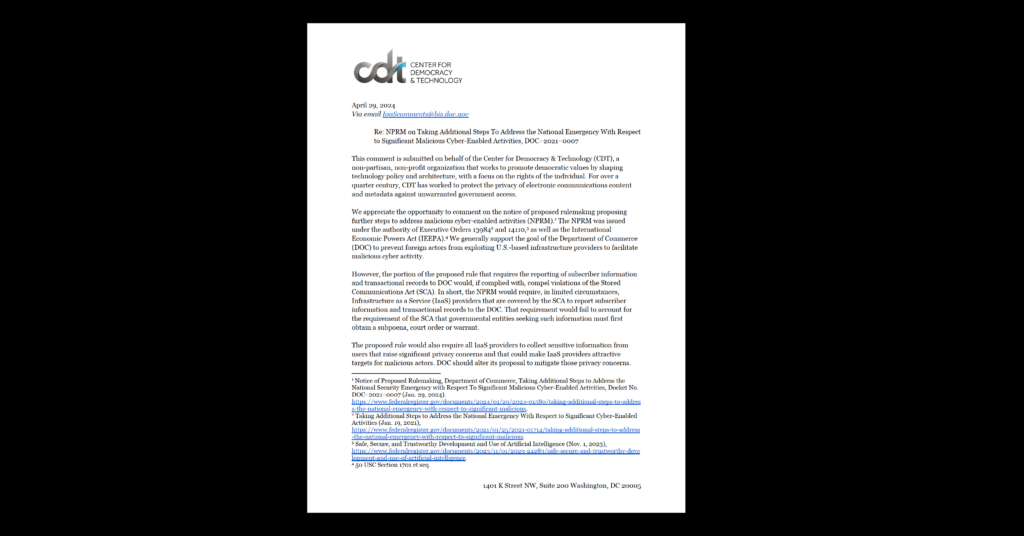Like Comparing a Ride on Horseback to a Flight to the Moon: Supreme Court Issues Sweeping Ruling on Cell Phone Privacy
Earlier this week, the Supreme Court issued a sweeping victory for privacy rights in Riley v. California, establishing strong protections for personal information on portable electronic devices, and strengthening the foundation for broad privacy protections in the digital age.
Clear Protections Established for Electronic Devices
The Court unanimously held that cell phones cannot be searched incident to an arrest without a warrant, a ruling that immediately extends privacy rights throughout the country in a significant way given the ubiquity of modern smartphones which hold gigabytes of sensitive communications and data. The ruling was largely based upon the frequency with which Americans carry and use cell phones, and the enormous range of personal information contained on them. CDT emphasized these points in an amicus brief submitted jointly to the Court with EFF, which was cited in the Court’s opinion. These features led the Court to conclude that comparing physical items to digital content on a phone “is like saying a ride on horseback is materially indistinguishable from a flight to the moon.”
Read CDT’s amicus brief submitted in Riley v. California
During oral arguments, the government contended that risk of remote wiping of a phone’s data required law enforcement to immediately search devices upon arrest, and discussed the possibility of a “reasonable belief” test, whereby law enforcement could conduct warrantless searches on phones seized during arrest when they have a reasonable belief that it would contain evidence of a crime. CDT urged the Court to reject both arguments, because permitting warrantless searches upon reasonable belief of finding evidence or to deter remote wiping would unnecessarily open the door to mass invasions of privacy. The Court did just that, saying that a “reasonableness test” for discovery of evidence “would prove no practical limit at all” and described the readily available technology that police departments already use to thwart remote wiping.
A Model for Privacy in the Digital Age
In addition to the immediate protections provided, Riley is significant in its stance that digital materials are fundamentally unique with regard to privacy. The Court astutely noted that modern technologies pose new privacy risks in terms of both the quantity and quality of what is stored, how it is accessed, and how it can be used. Combined with the Court’s ruling in U.S. v Jones two years ago, a strong foundation has now been established upon which digital rights can be built in the future.
The conclusion of the Court’s ruling states, “The fact that technology now allows an individual to carry such information in his hand does not make the information any less worthy of the protection for which the Founders fought.” This could as easily be said of a host of other technological advances, ranging from email to modern location tracking. Riley will likely serve as a strong source of support for privacy rights in a variety of cases in the future.
Spillover Effects: Cloud Computing, Cell Phone Location Information, and Bulk Collection
The Court’s decision could portend pro-privacy rules about information stored in the cloud, cell site location data, and bulk collection. In its determination that warrantless search of a cell phone is unconstitutional, the Court gave great weight to the fact that the phone user can, with the touch of a finger, access information stored in the cloud, and that the user often does not know whether the information displayed on the phone is stored remotely or on the phone. This would be nearly irrelevant if there is no reasonable expectation of privacy in that information. The Court has never ruled on whether communications content stored with a third party is protected by the Fourth Amendment; Riley may portend its stance when that case eventually reaches the Court.
Privacy of cell site location has been in focus since a landmark Eleventh Circuit ruling earlier this month that access to any cell site location data requires a warrant. The Court’s reference to location data on cell phones as sensitive information that serves as a factor of its decision in Riley could be strongly indicative of how it will rule on this matter, as could its citation to Justice Sotomayor’s statement in Jones that location data, “generates a precise, comprehensive record of a person’s public movements that reflects a wealth of detail about her familial, political, professional, religious, and sexual associations.”
The Court’s opinion could also have a groundbreaking impact on the ongoing debate regarding the legality of NSA bulk collection. In Riley, the Court states, “Many distinct types of information … reveal much more in combination than any isolated record.” This statement cuts directly against the key rationale the Foreign Intelligence Surveillance Court used in finding the telephony metadata bulk collection program Constitutional: If there is no privacy violation when the government takes one piece of data, there is no privacy violation when the government takes millions of pieces of data. The Court’s ruling correctly rejects this premise, and effectively replaces it with a commitment to jurisprudence that will protect privacy rights as technology evolves.


